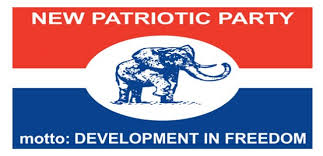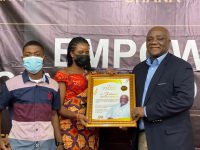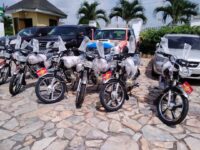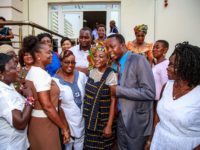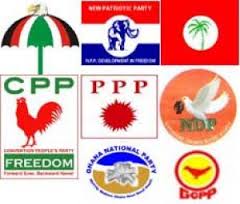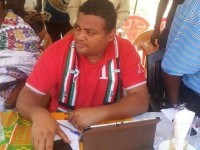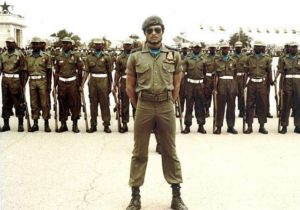 At about 11 am on the coup day the voice of Rawlings came on air calling for nothing less than a revolution – something that will transform the social and economic order of this country. On the night of Saturday, January 2, 1982, he made a second broadcast on radio and TV in which he accused the Limann administration of deliberately reneging on the pledge to continue the ‘house-cleaning’ exercise. Rawlings described the immediate past administration as the most disgraceful government in the history of this country. He continued: ‘It is only in recent times that criminals and the likes have become respectable in our society. . .They have turned our hospitals into graveyards and our clinics into death transit camps where men, women and children die daily because of lack of drugs and basic equipment.’
At about 11 am on the coup day the voice of Rawlings came on air calling for nothing less than a revolution – something that will transform the social and economic order of this country. On the night of Saturday, January 2, 1982, he made a second broadcast on radio and TV in which he accused the Limann administration of deliberately reneging on the pledge to continue the ‘house-cleaning’ exercise. Rawlings described the immediate past administration as the most disgraceful government in the history of this country. He continued: ‘It is only in recent times that criminals and the likes have become respectable in our society. . .They have turned our hospitals into graveyards and our clinics into death transit camps where men, women and children die daily because of lack of drugs and basic equipment.’
He went on to announce the suspension of the 1979 Third Republican Constitution, the dismissal of all members of the government, the dissolution of Parliament and the banning of political parties. Rawlings proclaimed the establishment of the Provisional National Defence Council – PNDC, the members of whom would be announced later, as the supreme political authority in Ghana. By the PNDC establishment proclamation – January 11, 1982, provision was made for an eleven member council. However, only seven were named initially.
They were; Flight-Lieutenant Jerry John Rawlings as Chairman, Brigadier Joseph Nunoo-Mensah, the Rev. Dr. Vincent Kwabena Damuah, Warrant Officer Class 1 Joseph Adjei Boadi. Sergeant Daniel Alolga Akata-Pore, Joachim Amartey Quaye and Chris Bukari Atim. By the close of 1982, only Rawlings and Adjei Boadi remained. Mrs. Aanaa Enin, Nandom Na, Naa Polkuu Konkuu Chiiri were added to the Council by mid-1984. After the death of Naa Polkuu Konkuu Chiiri on August 25, 1984 (at the age of 51) his place was taken by the appointment of Alhaji Mahama Iddrisu.
In July 1984 additional members were appointed in the persons of Mrs. Susan Alhassan and Justice D. K Annan. The Council was again expanded in July 1985 when two new members were appointed – Captain (Rtd) Kojo Tsikata, who had previously been the Special Adviser to the PNDC, was now PNDC member responsible for Foreign Affairs and National Security, and P.V. Obeng – PNDC Coordinating Secretary and Chairman of the Committee of PNDC Secretaries. Getting to the end of 1985 two further members were added. Major-General Arnold Quainoo, (the Force Commander) and Brigadier Mensah-Wood (Commander of the Military Academy and Training School).
It must be noted that the PNDC faced stiff opposition culminating in a series of plots, the most significant being the events of October/November 1982 and of June 19, 1983. In what could be described as a coup d’etat by press conference on October 29, 1982, at a meeting of the Accra and Tema Workers Defence Committees – WDCs, some leaders of the June Fourth Movement – JFM, and the People’s Revolutionary League of Ghana – PRLG, announced that Sergeant Akata-Pore, a leader of the JFM, Secretary of the Armed Forces Defence Committees and an ‘original’ member of the PNDC, had replaced Rawlings as Chairman of the PNDC. Confusion reigned in Accra until Rawlings was notified whereupon he called a press conference (November 12, 1982) at which the principal instigators were present and informed the press that though there was misunderstanding it had been resolved.
Then on November 23, 1982 armed men succeeded in capturing for a while, part of Gondar Barracks, Burma Camp. When the situation was returned to normal several arrests were made: they included Sergeant Akata-Pore, Tata Ofosu – editor of the JFM’s paper The Workers’ Banner and Kwame Pianim. The suspects were put on trial but some managed to escape from prison custody on June 19, 1983 as part of that day’s attempted coup d’etat.
The June 19, 1983 attempted coup d’etat which came closest to overthrowing the PNDC was led by Sergeant Abdul Malik and Corporal Carlos Halidu Giwa who announced himself over GBC radio as the rebel ‘Operational Commissioner’. After some resistance, the rebels were over-powered by the combined force of loyal soldiers led by Warrant Officer Adjei Boadi and Captain Courage Kwashigah. Captain Kwashigah announced that the PNDC was back in control.
Apart from these plots the PNDC was opposed by groups formed by Ghanaian residents abroad. The groups were the Campaign for Democracy in Ghana and the Ghana Democratic Movement both based in London, but who had members and well-wishers around Europe, notably in the former West Germany and North America. They also had active branches in Lome, Togo, and Lagos, Nigeria. Another source of opposition was Elizabeth Ohene’s magazine, the Talking Drum and the Movement on National Affairs – MONAS which launched constant attacks on the regime.
To give meaning to its care for the masses to be part of the decision-making process the regime established institutions that would promote this. The institutions created were: the Peoples Defence Committees – PDCs, the Workers Defence Committees – WDCs and the National Defence Committees – NDCs, which were set up at community, workplace, district, regional and national levels.
The NDC coordinated the PDCs. In December 1984 the defence committees were renamed and re-structured as CDRs – Committee for the Defence of the Revolution. The NDC was disbanded. Instead the CDRs of each region were made responsible to the PNDC Regional Secretary. Another organisation which was to mobilise support for the regime was the 31st December Women’s Movement founded in 1982 by the wife of the Head of State, Nana Konadu Agyeman Rawlings.
As part of the process of ensuring social justice and for dealing with persons whose activities ran contrary to what the PNDC stood for, a number of institutions were established. They were the National Investigations Committee -NIC, the Citizens Vetting Committee – CVC, and the Public Tribunals. The National Investigations Committee was established by the National Investigations Committee Law 1982 (PNDCL 2).
It was to investigate cases of corruption. Initially, any person whose bank account had a credit of C50,000.00 (about US $16,000.00 at the time) or more was obliged to explain the source of the income and justify its genuineness or forfeit the amount to the state. Its stated purpose was to discourage corruption and mop up excess liquidity in the system. The CVC was established in 1982 by PNDC Law 1. The CVC investigated anyone whose lifestyle, compared to the supposed income, gave cause for suspicion. It concerned itself with tax evasion in particular, as well as over-invoicing, fraudulent bank loans, offenses relating to customs and excise, currency trafficking etc.
The Citizens Vetting Committee (Amendment) Law 1982 (PNDCL 18) created a new Section 7 which enhanced the Committee’s powers to include the forfeiture to the State of any property and recommendation to the appropriate authority, the dismissal, removal or retirement of persons from the public service on the grounds of misconduct or negligence in performance of duty.
The net of the CVC was so wide that almost every professional or businessman or woman could be made to appear before it in Accra or its regional offices. Later, the Office of the Revenue Commissioners – ORC took over matters relating to taxation. Public Tribunals were set up under PNDCL 78 to translate into reality, the ideals of popular justice. They were to respond to three main problems in the system of the administration of justice: its slowness and cumbersome procedures; its inflexibility and intimidating character particularly to the people of the lower classes, that is, its alienating class character, and wide-spread corruption.
Rightly or wrongly, it was widely believed by the masses that the courts did not dispense justice fairly, more especially when the case involved a ‘big shot’ and an ordinary person. Therefore, the Public Tribunals were places where ‘real’ justice could be found. Apart from the presiding judge who should have some professional knowledge in law, the rest of the panel should not necessarily be lawyers. Its jurisdiction was unlimited and could sit on any case including trying people in absentia. Nobody supervised it or reviewed its decisions except the Head of State who had the power to reduce and not increase sentences. Initially, there was no appeal to its judgment, but, after several representations the PNDC Law 78 was amended to allow retrials and appeals for other reasons.
